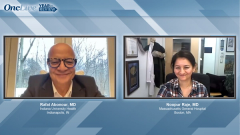
Optimizing BCMA-Targeted CAR-T Therapies: Patient Selection, Clinical Impact, and Treatment Sequencing
Experts delve into the optimal positioning of BCMA-targeted CAR-T therapies in the treatment plan for Relapsed/Refractory Multiple Myeloma (R/R MM), providing valuable perspectives on strategic considerations in myeloma care.
Episodes in this series

This is a video synopsis/summary of an OncLive® Post-Conference Perspective involving Rafat Abonour, MD, and Noopur Raje, MD.
Abonour and Raje discuss which patients are ideal candidates for earlier treatment with B-cell maturation antigen (BCMA)–targeted chimeric antigen receptor(CAR) T-cell therapy or bispecific antibodies in relapsed/refractory multiple myeloma.
Raje emphasizes moving immunotherapies earlier into the treatment paradigm, as responses tend to be more durable the earlier these highly effective treatments are utilized. She advocates for initial use in high-risk patients given the unmet need, as demonstrated in the CARTITUDE-2 trial’s cohort A. However, over time, more patients overall may receive CAR T cells earlier.
Compared with autologous transplant, patients tend to prefer CAR T-cell therapy for its easier lymphodepletion without prolonged pancytopenia. Adverse effects like cytokine release syndrome and neurotoxicity are manageable, but immunodeficiency requires vigilant infection prevention.
When discussing the decision between modalities, Raje notes that longer manufacturing times for CAR T cells make them less ideal for rapidly progressive disease. There, bispecifics may be preferentially selected. If time allows, she says, she advocates for using CAR T cells before bispecifics due to concerns about T-cell exhaustion affecting subsequent CAR T-cell production after bispecific therapy.
Video synopsis is AI-generated and reviewed by OncLive® editorial staff.







































